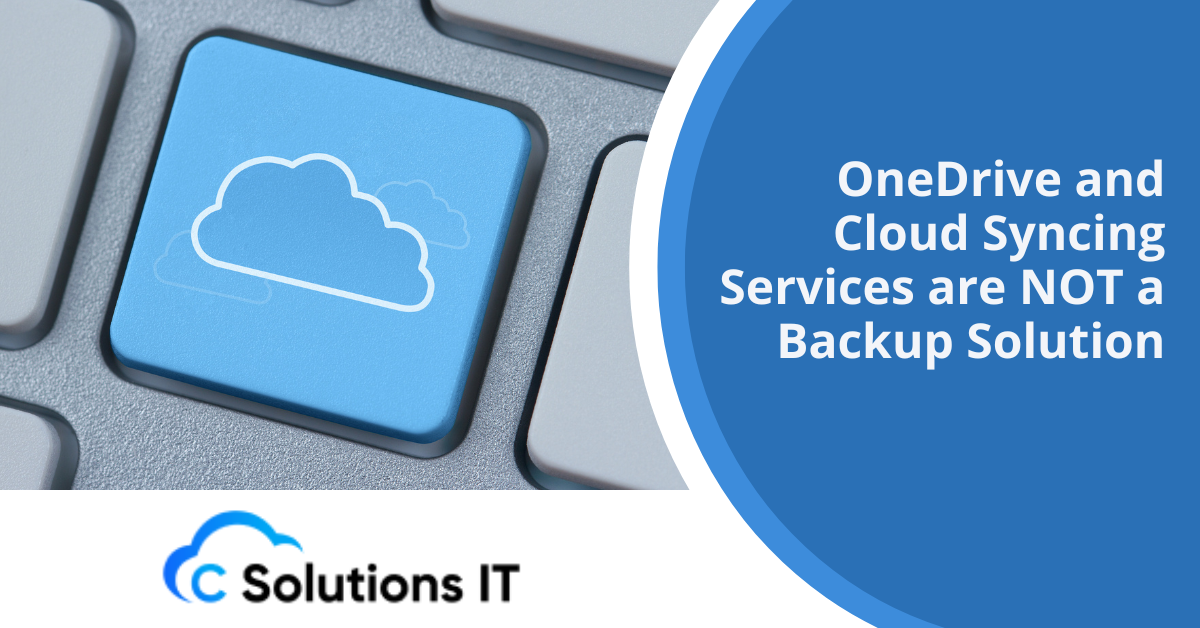OneDrive and Cloud Syncing Services are NOT a Backup Solution

In today’s digital landscape, where data is the lifeblood of both personal and professional endeavors, safeguarding its integrity and accessibility stands as a paramount concern. With the advent of cloud storage services such as OneDrive, Dropbox, and Google Drive, individuals and businesses alike have embraced the convenience of storing, synchronizing, and sharing their data across various devices and locations.
However, it is crucial to recognize that while these services excel in synchronization capabilities, they fall short of constituting a comprehensive backup solution.
Understanding the Limitations
Cloud syncing services, while providing a level of redundancy by storing data on remote servers, are not impervious to data loss incidents. Users may inadvertently delete files or encounter instances of file corruption, with these issues potentially propagating across synchronized devices, ultimately leading to irreversible data loss.
Furthermore, while such services may offer limited versioning capabilities allowing users to restore previous file versions within a certain timeframe, this feature may prove inadequate for scenarios necessitating long-term backups or historical data recovery.
Additionally, cloud syncing services are not immune to ransomware attacks, which present a significant threat to data integrity. In the event of a ransomware infection on a synchronized device, the malware can encrypt files not only on local storage but also on cloud storage, rendering them inaccessible.
The Importance of Backup Strategies
A robust backup solution is indispensable for ensuring comprehensive data protection. By creating copies of files in secure, off-site locations, such a solution mitigates the risk of data loss stemming from accidental deletions, hardware failures, malware attacks, or natural disasters.
Long-term retention capabilities offered by backup solutions far surpass those of cloud syncing services. While the latter may impose limitations on version history retention, backup solutions afford organizations the flexibility to preserve historical data for extended periods, often crucial for compliance, auditing, or reference purposes.
Moreover, the implementation of immutable backups adds an extra layer of security against ransomware attacks. By maintaining a separate, immutable backup repository, organizations can shield critical data from encryption or tampering attempts, thereby safeguarding their operations and reputation.
Implementing a Backup Strategy
To effectively safeguard data, organizations must first evaluate their specific requirements. Factors such as data volume, retention policies, compliance requirements, and recovery objectives should be carefully assessed to determine the most suitable backup strategy.
Once requirements are established, organizations can proceed to select backup solutions that align with their needs. Whether opting for on-premises backups, cloud-based solutions, or a hybrid approach, factors such as scalability, reliability, security features, and ease of management should be taken into consideration.
Automation plays a crucial role in ensuring regular and consistent data backups without manual intervention. By scheduling backup jobs to run at convenient times while minimizing impact on system performance and network bandwidth, organizations can streamline their backup processes and enhance operational efficiency.
Regular testing and validation of backup and recovery procedures are essential to verify the integrity and effectiveness of the chosen backup solution. Conducting simulated recovery scenarios allows organizations to identify and address any potential weaknesses in their backup infrastructure, thereby bolstering their resilience against data loss incidents.
Safeguard Your Data
While cloud syncing services like OneDrive offer convenient means of data synchronization and collaboration, they should not be mistaken for comprehensive backup solutions. To effectively safeguard against data loss incidents, organizations must prioritize the implementation of robust backup strategies tailored to their specific needs and requirements.
By selecting suitable backup solutions, automating backup processes, and regularly testing and validating backup procedures, organizations can ensure the integrity and accessibility of their data, thereby safeguarding their operations and reputation.
For expert guidance and assistance in implementing a robust backup strategy tailored to your organization’s needs, contact C Solutions IT.
